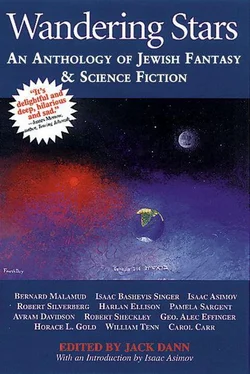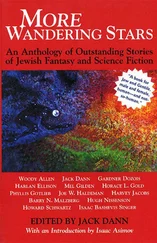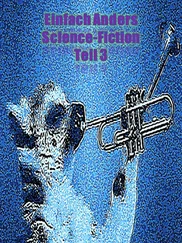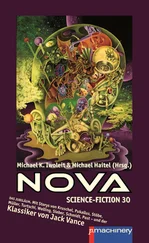And it explained about the genealogical charts it was offering in evidence. The most prized possession of every Jewish family on Rigel IV was its genealogical chart. These records had been preserved intact through fires and wars and pogroms, no matter what else had been destroyed. No Jewish wedding ever took place on Rigel IV unless both parties could produce thoroughly validated genealogical charts. Through them, each Jewish Bulba could trace his ancestry back to the very first settlers on the planet.
“I, for example,” the speaker said proudly, “I, Yitzhak ben Pinchas, am the direct descendant of Melvin Cohen, the assistant manager of a supermarket in Paramus, New Jersey.”
And the argument got thicker and thicker. How is it possible, the judges wanted to know, for such tremendous changes to take place? Isn’t it more likely that at some time or another all the Jews on Rigel IV were wiped out and that then there was a mass conversion of some sort, similar to the one experienced among the Khazars of the eighth century and the Japanese later? No, said the Bulbas, if you knew what conditions have been like for Jews on Rigel IV you wouldn’t talk about mass conversions to Judaism. That would have been mass insanity. All that happened is that we began as ordinary Jews, we had a lot of trouble, a lot of time went by, and when it was all over this is what we looked like.
“But that denies the experimental facts of biology!”
The Bulbas were very reproachful. “Who are you going to believe, the experimental facts of biology—or your fellow Jews?”
And that was just the first day. I got back to my apartment and I told my brother all about it. We began discussing the case. He took one side and I took the other. In a few minutes, I was waving my fist in his face and he was screaming that I was “an idiot, an animal!” From the next room we heard the wonder-working rabbi from Procyon XII trying to quiet down a similar argument among the members of his court.
“They want to be Jews,” my brother yelled at me, “let them convert to Judaism. Then they’ll be Jews. Not before.”
“Murderer!” I said to him. “Dolt of dolts! How can they convert to Judaism when they’re already Jews? Such a conversion would be a filthy, shameful mockery!”
“Without a conversion I absolutely refuse to go up on the bima and read a portion with one of them. Without a conversion they cannot join my minyan , even if no matter where I look I can’t come up with more than nine men. Without a conversion, even if I’m celebrating a circumcision ceremony for a son—” He broke off, his eyes got suddenly calmer, more thoughtful. “How do they circumcise, do you suppose, Milchik? Where and what do they circumcise?”
“They cut off a very little bit from the tip of their shortest tentacle, Uncle Fleischik,” said my Aaron David, who’d just walked in. “It’s a fold of flesh that looks a lot like a foreskin. Besides, you know, only one drop of blood is required by the Covenant. Blood they got.”
“A new speciality,” said Sylvia as she put out the supper. “Now , God be praised and thanked, my son is a mohel.”
Aaron David kissed her. “Put my supper aside until later, Mamma. Me and the Bulbas are going to meet with Rabbi Smallman in his study.”
Let me tell you, maybe my son was no longer the interpreter since the Bulbas had found voices, but he was still their floor manager. Every day I could see him jumping from one to the other while the case was being discussed. Something special has to be looked up? They need a copy of Rov Chaim Mordecai Brecher’s Commentary on the Book of Ruth ? Who goes running out of the hall to get it but my Aaron David?
After all, that turns out to be a very important issue. Ruth was a Moabite, and from her came eventually King David. And how about Ezra and the problem of the Jewish men who took Canaanite wives? And where do you fit the Samaritans in all this? Jewish women, you’ll remember, were not allowed to marry Samaritans. And what does Maimonides have to say on the subject? Maimonides is always Maimonides.
I tell you, day after day, it was like the dream of my life to listen to all those masters and sages.
And then the Court comes through time to the formation of the Jewish State in the twentieth century. All those problem cases when the Ingathering began. The Bene-Israel Jews, for example, of Bombay. The other Indians called them Shanwar Teles , “Saturday oilmen,” and they were supposed to have arrived in India as a result of the invasion of Palestine by Antiochus Epiphanes. Almost all they remembered of Judaism was the Shema , and there were two castes who didn’t intermarry, one white, one black. Were they really Jewish? Were both castes Jewish? And how do you prove it?
And more up-to-date, more complicated discussions. The Japanese and the Conversion of 2112, and the results among Jews of the Ryo-Ritsu tractates. The Mars-Sirius controversy and the whole problem of the blue Jews. The attitude of the Lubavitchers toward Sebastian Pombal—let Pombal and Crevea, I say, lie deep, deep in the ground—and what that meant to Israel as an independent state.
It all comes down to: What is a Jew?
So one of the Bulbas can say, in that thin, rustling voice: “Do not put me in the position of the Wicked Son in the Haggadah. Do not put me in the state of yotzei min haklal , one who departs from the Congregation. I have said we to my people; I have not said you.” So he quotes from the Passover service, and all of us have a catch in our throat and tears on our face. But it still comes down to: What is a Jew? Wherefore is this people different from every other people?
And you know something? That’s not an easy question to answer. Not with all the different kinds of Jews you’ve got around today.
So the Court can move into other, even more tangled-up places. It can weigh the definition of a human being that was worked out by the Council of Eleven Nations Terrestrial, during the Sagittarian War. It can look at Napoleon’s questions on intermarriage and the answers of the Paris Sanhedrin of 1807. It can turn at last to Cabala , even if three of its members don’t want to, and ask about the problem of monster births that are brought on by cohabitation with the Children of Lilith. But in the end it has to decide what a Jew is, once and for all—or it has to find some kind of new way out.
Rabbi Smallman found some kind of new way out. On Venus, I’m telling you, have we got a rabbi!
Since this was a special court, set up under special circumstances, facing a question nobody had ever faced before, I expected more than one decision. I expected sweet and sour decisions, hot decisions and cold decisions, chopped decisions and marinated decisions. I was sure we’d see them “confound there their language, that they may not understand one another’s speech.” But no. Rabbi Smallman argued with each and all, and he brought them around to one point of view, and he wrote most of what was the final judgment. To bring a bunch of Jews—and learned Jews!—to a single decision, that, my friend, is an achievement that can stand.
All through the case, whenever an argument broke out between the judges, and it looked like we were going to spend a couple of weeks on whether it was a black thread or a white thread, you’d see Rabbi Smallman scratch the red pimple on the side of his nose and say that maybe we could all agree on the fact that at least it was a piece of thread? And I got the impression—I admit it’s a father speaking—that he looked at my Aaron David, and that my Aaron David nodded. This was even before they came in with a judgment.
Читать дальше












